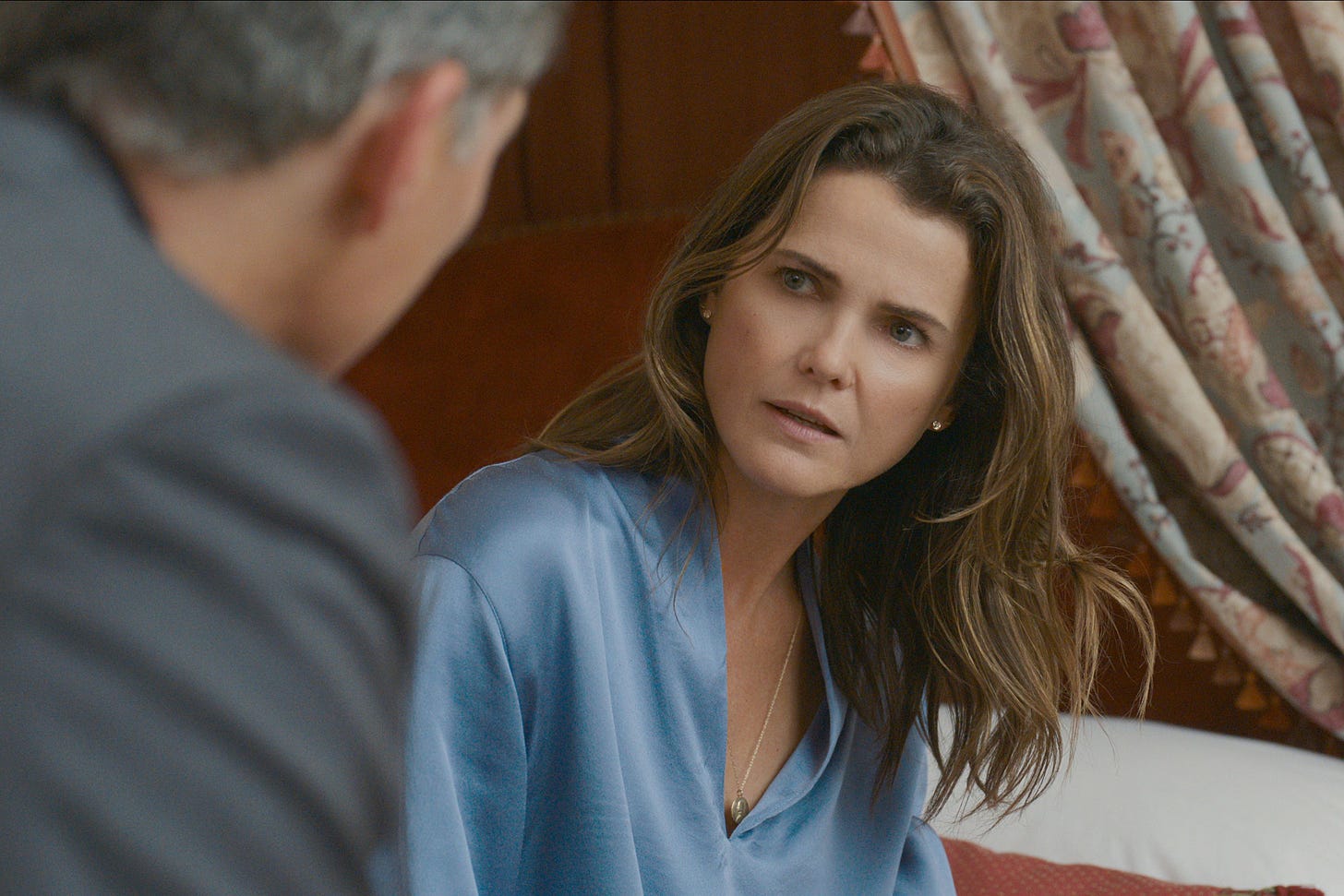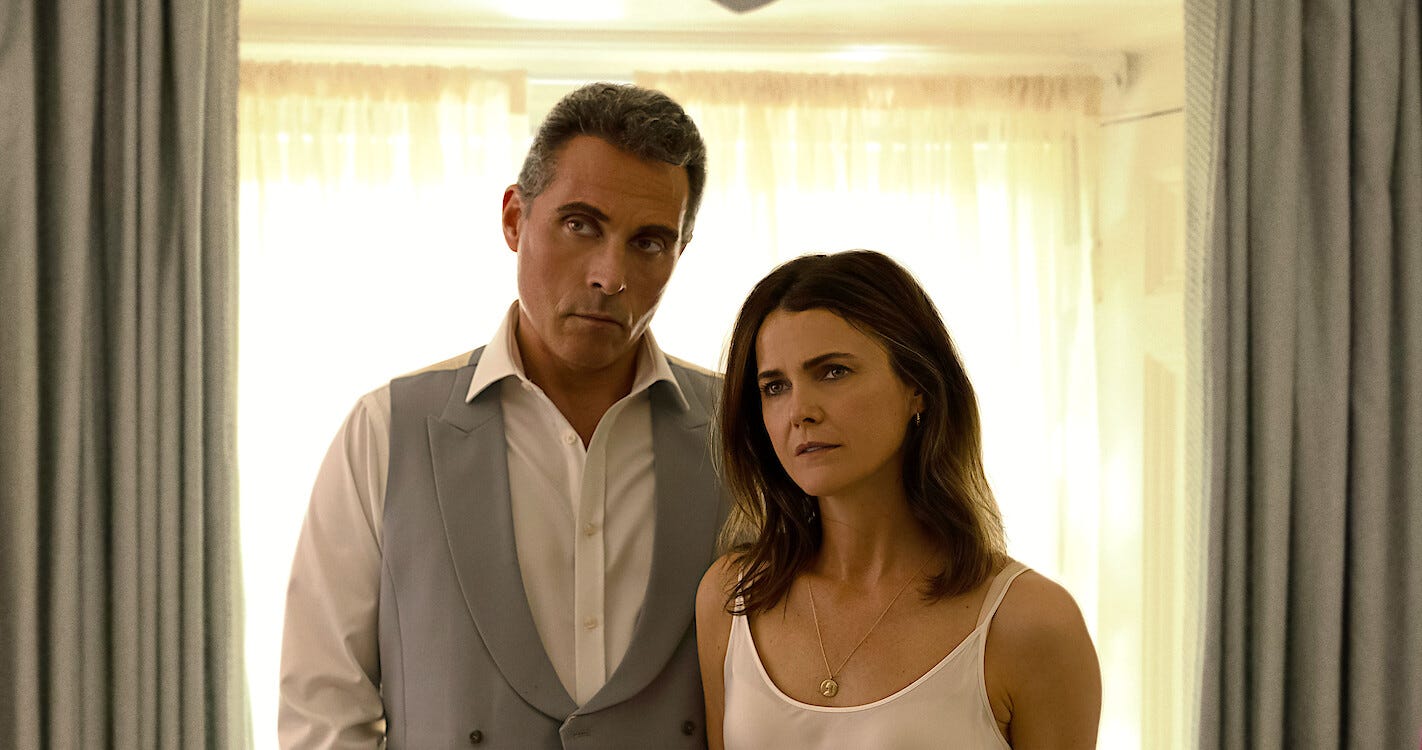The Diplomat Is An Authoritarian Fantasy for Liberals
Kate Wyler, Like Trump, Heroically Dispenses With Democratic Accountability
Debora Cahn was a writer for The West Wing, and her Netflix show The Diplomat isn't shy about its Democratic party sympathies. The aging, crusty, but basically honorable president William Rayburn (Michael McKean) is an obvious Biden analogue. His unnamed predecessor, often criticized for his failure to engage with global diplomacy, is just as obviously supposed to be Trump. The show celebrates career diplomats and civil servants, those untrustworthy deep staters that the GOP keeps villifying. It denigrates xenophobic Brexiters and right wing "compassionless conservatives." There's little question that the star, pragmatic, committed career foreign service officer Kate Wyler (Keri Russell) votes blue.
And yet, despite its clear liberal partisan bias, the show sets itself against voting with antidemocratic instincts that would do MAGA proud.
This isn't that surprising; Hollywood has a long history of portraying democracy as an unsavory, and even unnecessary, barrier to virtue and good policy. But that hoary anti-populist boilerplate looks especially misguided post-J6 coup, as we face a full-blown authoritarian assault on the principles of self-governance. The supposedly progressive Diplomat inadvertently underlines the extent to which pulp tropes are incompatible with progressive principles—such as representative democracy.
The Spy Who Didn't Really Love Democracy
The Diplomat begins with Kate being informed that her appointment to Kabul has been cancelled. A terrorist attack on a British tanker, killing 41 servicepeople, has changed the diplomatic calculus. Suddenly, the US needs a serious diplomat in London rather than a political appointee. Kate's job is to prevent war with Iran.
Unbeknownst to Kate, White House Chief of Staff Billie Appiah (Nana Mensah) has another agenda. She and Kate's brilliant, erratic diplomat husband Hal (Rufus Sewell) believe Kate might be the perfect replacement for the scandal-ridden vice-president. Stuart Hayford (Ato Essandoh), a American diplomat in London who was once a political campaign coordinator, is charged with observing Kate and readying her for her possible high-profile promotion.
The Diplomat is great pulpy espionage fun, with Kate as a frazzled, determinedly inelegant female James Bond. It turns out Iran was not responsible for the attack on the British vessel, and Kate and company have to try to track down the real culprit while preventing trigger-happy putz Prime Minister Trowbridge (Rory Kinnear) from starting a global conflagration. Off to the side, Kate juggles her disintegrating marriage and her growing attraction to yummy British foreign secretary Dennison (David Gyasi.)
Pulpy espionage fun, though, doesn't have a lot to do with the actual workings of democracy. On the contrary, the focus on Kate as brilliant, contrarian, noble protagonist tends to sideline—well, basically everyone else in the world, and certainly everyone else in the American and British polity.
No Protest, No Campaigns
Trowbridge wants to go to war in order to shore up public support and prevent Scotland from leaving the British union. But would Scottish voters actually be enthusiastic about another war in the Middle East, much less a high-stakes nuclear conflict? Would a US war on behalf of Britain actually be so popular that the American president wouldn't even consider public opinion?
The show doesn't bother to ask those questions, much less answer them. There's no antiwar protest, no antiwar organizing. There's not even any pushback against war by opposition parties or legislators. The only public sentiment we ever see is pro-war; a widow of one of the dead British servicemen demands that Trowbridge attack Iran, prompting him to make a belligerent speech which is then applauded vociferously.
The public is portrayed as an ignorant, reactionary monolith that can't be trusted with diplomatic decisions—rather than as a heterogenous set of interest groups which often includes progressive elements. In the Iraq war, as just one example, there were mass demonstrations by members of the public who were a lot more perspicacious than the supposedly serious people in charge.
The show's contempt for public opinion and activism slides into a contempt for political campaigning. Kate, as a career official, hates the ceremonial aspects of her job. She doesn't like to give speeches; she doesn't like to wear dresses; she doesn't like to wear suits that are any color but black. (Watching Keri Russell, whose image has often been quite girly, look convincingly uncomfortable every time she gets anywhere near a gown is one of the series' delights.)
Normally, a vice-president would need to be someone who likes meeting the public, or can at least fake it. But the plan is to appoint Kate. She will never need to campaign. This is presented as a boon not just for her, but for the common good. People who want power shouldn't have it, various characters agree sententiously. Wouldn't it be great, they all muse, if you could just put competent people in place without the messy business of trying to market yourself to a shallow, ignorant electorate?
Stars Against Voting
This attitude has a lot of precedent in Hollywood. Film and television often present the politiciking side of politics as an inconvenience at best and a barrier to virtue at worst. It's notable that virtuous Senator Jeff Smith in Mr. Smith Goes to Washington (1939) is appointed, not elected. In 1972's The Candidate, the process of campaigning is shown as stripping idealistic Senate hopeful Bill McKay of his principles, his morals, and his purpose. Senator Bullworth in 1998's Bullworth only becomes cool and hip and ethical when he stops worrying about his public image and his reelection.
And so forth. Trying to win votes, according to Hollywood, is vaguely, or more than vaguely, disreputable.
This anti-campaigning message is in line with a lot of boilerplate anti-establishment folk wisdom. People find campaigns fake and irritating. They're not exactly wrong—but campaigns are also an important, and central part of democracy. Politicians work for us; they need to go out and ask us for a job.
Campaigns are where politicians make promises to constituencies and interest groups (promises that, contra conventional wisdom, they generally try to keep.) It's where they hear from the public. Campaigns are also how politicians are held accountable. Running for office isn't an inconvenient detour in the business of democracy. Running for office is democracy.
The recent public figure who most hates campaigning isn't some serious foreign policy wonk like Kate. It's Donald Trump. Yes, Trump likes to hold rallies and loves public adulation. But he doesn't want to have to actually ask people for their votes. Instead, as he demonstrated once and for all in 2020, he thinks he's entitled to office. The alternative to political campaigns isn't no-nonsense meritocratic rule by camera-shy Kate. It's the shallow staged glitz of authoritarian fascism.
That Is Not Your Color...Or Maybe It Is
That shallow staged glitz is a decent description of The Diplomat itself. The series embraces a peak-tv, high production value aura of seriousness and grit; Kate's no-nonsense low-fi butch style is meant as a guarantor of authenticity and realism. But the plot inevitably frames her as Hollywood hero, the singular star on the world stage. She's the brilliant American negotiator who can get to yes through sheer force of intelligence, rhetoric, and star power—which is of course precisely how Trump likes to see himself.
The Diplomat doesn't like Trump. But it inadvertently shows why authoritarian movements have such appeal, even to those in theory committed to opposing totalitarianism. Democracy is messy and uncool and has no one real hero to cheer for. Why can't we have a hero who dispenses with all the artificial (feminized) flim flam compromise, and just makes the tough choices whether the public likes it or not? Kate hates both Trump and heavy make-up. But still, when you think about it just a little, she starts to look a little orange.






Blech. I tried it. Couldn't watch it.
::Why can't we have a hero who dispenses with all the artificial (feminized) flim flam compromise, and just makes the tough choices whether the public likes it or not?::
Well, you know, writing about a representative democracy is HARD! It's also totally not Hollywood, which has always treated collective action as Rock-Throwing Mobs: Remember every version of A TALE OF TWO CITIES? Fritz Lang's FURY? All the Sixties movies meant to appeal to the antiwar movement but ended with violent riots?
That's not a good story, according to Hollywood—a good story is Keri "Duke" Russell riding into town with her six-shooters holstered on her belt and her hat low over eyes so you can't see what she's thinking, right before she guns down a several nameless thugs to let everybody know she means business!
It is wrong of me to want to see that movie now...? 🤪